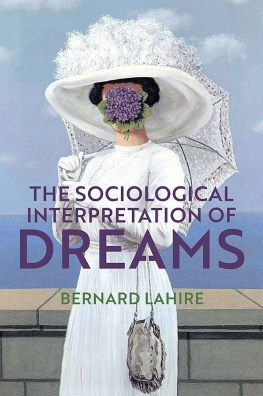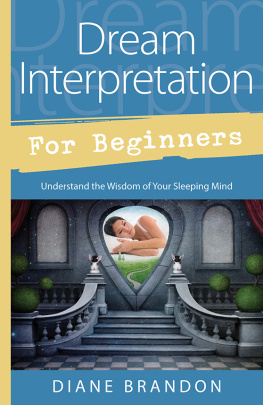Bernard Lahire - The Sociological Interpretation of Dreams
Here you can read online Bernard Lahire - The Sociological Interpretation of Dreams full text of the book (entire story) in english for free. Download pdf and epub, get meaning, cover and reviews about this ebook. year: 2020, genre: Religion. Description of the work, (preface) as well as reviews are available. Best literature library LitArk.com created for fans of good reading and offers a wide selection of genres:
Romance novel
Science fiction
Adventure
Detective
Science
History
Home and family
Prose
Art
Politics
Computer
Non-fiction
Religion
Business
Children
Humor
Choose a favorite category and find really read worthwhile books. Enjoy immersion in the world of imagination, feel the emotions of the characters or learn something new for yourself, make an fascinating discovery.
- Book:The Sociological Interpretation of Dreams
- Author:
- Genre:
- Year:2020
- Rating:5 / 5
- Favourites:Add to favourites
- Your mark:
- 100
- 1
- 2
- 3
- 4
- 5
The Sociological Interpretation of Dreams: summary, description and annotation
We offer to read an annotation, description, summary or preface (depends on what the author of the book "The Sociological Interpretation of Dreams" wrote himself). If you haven't found the necessary information about the book — write in the comments, we will try to find it.
The Sociological Interpretation of Dreams — read online for free the complete book (whole text) full work
Below is the text of the book, divided by pages. System saving the place of the last page read, allows you to conveniently read the book "The Sociological Interpretation of Dreams" online for free, without having to search again every time where you left off. Put a bookmark, and you can go to the page where you finished reading at any time.
Font size:
Interval:
Bookmark:
To my mother
Bernard Lahire
Translated by Helen Morrison
polity
First published in French as LInterprtation sociologique des rves ditions La Dcouverte, Paris, France, 2018
This English edition Polity Press, 2020
Polity Press
65 Bridge Street
Cambridge CB2 1UR, UK
Polity Press
101 Station Landing
Suite 300
Medford, MA 02155, USA
The translation of this work was supported by the Institut Universitaire de France
All rights reserved. Except for the quotation of short passages for the purpose of criticism and review, no part of this publication may be reproduced, stored in a retrieval system or transmitted, in any form or by any means, electronic, mechanical, photocopying, recording or otherwise, without the prior permission of the publisher.
ISBN-13: 978-1-5095-3795-2
A catalogue record for this book is available from the British Library.
Library of Congress Cataloging-in-Publication Data
Names: Lahire, Bernard, author.
Title: The sociological interpretation of dreams / Bernard Lahire ; translated by Helen Morrison.
Other titles: Interprtation sociologique des rves. English
Description: Medford : Polity, 2020. | Includes bibliographical references and index. | Summary: A major new account of dreams that rivals Freuds classic work-- Provided by publisher.
Identifiers: LCCN 2019045571 (print) | LCCN 2019045572 (ebook) | ISBN 9781509537945 (hardback) | ISBN 9781509537952 (epub)
Subjects: LCSH: Dream interpretation. | Dreams--Social aspects. | Sociology.
Classification: LCC BF1078 .L3313 2020 (print) | LCC BF1078 (ebook) | DDC 154.6/3--dc23
LC record available at https://lccn.loc.gov/2019045571
LC ebook record available at https://lccn.loc.gov/2019045572
The publisher has used its best endeavours to ensure that the URLs for external websites referred to in this book are correct and active at the time of going to press. However, the publisher has no responsibility for the websites and can make no guarantee that a site will remain live or that the content is or will remain appropriate.
Every effort has been made to trace all copyright holders, but if any have been overlooked the publisher will be pleased to include any necessary credits in any subsequent reprint or edition.
For further information on Polity, visit our website: politybooks.com
This work would not have been possible without the time made available through my delegation to the Institut Universitaire de France and the funding allocated to completing it in the context of a research programme entitled Sociology of dreams: oneiric productions between the incorporated past, the circumstances of waking life and the context of nocturnal life (Sociologie des rves: les productions oniriques entre pass incorpor, circonstances de la vie diurne et cadre de la vie nocturne).
I would like to thank Howard Becker (formerly of the University of Washington), Gary Alan Fine (Northwestern University), Christian Baudelot (ENS Ulm) and Roger Chartier (Collge de France) for their kind support in this research project; Ludwig Crespin (Universit de Clermont-Ferrand) for allowing me access to his thesis even before its submission; Perrine Ruby (INSERM) for our discussions prior to the writing of this book; Julien Barnier (Centre Max Weber, CNRS) for his invaluable schematic contribution to the thinking behind this project; and to all the dreamers who, since January 2014, have regularly shared their dreams with me and who have put up with many hours of interviews, thus helping me to test the theoretical and methodological arguments which are discussed in this work. Their stories, both real and dreamed, will be revealed in a second volume.
Finally a special thanks to Nathan for sharing my moments of both enthusiasm and doubt and for his helpful and wise suggestions for some of the titles. Thanks also to Hugues Jallon for his attentive re-reading of the manuscript, for his advice and for his unwavering support.
A dream is a sausage mill you feed your life into.
(Benjamin Whitmer,Pike, p. 168)
Dreams are both extremely appealing and extremely troubling for the sociologist. Their appeal lies in their potential to throw light on an aspect of our experience which generally remains intriguing and yet ultimately unfathomable. For any researcher with a taste for adventure, the prospect of attempting to comprehend the incomprehensible represents an exhilarating scientific challenge.
Yet the curiosity and intellectual excitement provoked by such a phenomenon can quickly give way to anxiety.
Initially this is linked to several characteristics of the object in question. The dream is a mental phenomenon, occurring when subjects are asleep and, consequently, when they are incapable of speaking. It is a product of the imagination but something which the dreamers themselves experience as though they were plunged into the most vivid reality. It is not always remembered on waking and, even when that is the case, is often quickly modified or forgotten, consequently rendering the researchers task infinitely more difficult than that of getting subjects to talk about their waking activities. Finally, the dream appears strange, incoherent, delirious or incongruous in the eyes of the person who has produced it. The task is therefore theoretically and methodologically extremely challenging for researchers, and the study of dreams can rapidly turn into something of a nightmare.
And that is not all. Like the fairy-tale castle to which we seek to gain access, the dream-object is surrounded by thorns and guarded by a dragon. These thorns, this dragon, which render access to the dream so difficult, represent all the many past attempts to interpret dreams, and especially that associated with psychoanalysis. For a twenty-first-century researcher, it is difficult to dissociate dreams from the name of Sigmund Freud. The extent of Freuds work, with its multiple shifts, whether acknowledged or unspoken, the abundance of commentaries it has inspired, and the schools or trends which have shared its heritage are all enough to dampen the desire for knowledge and to keep the inquisitive at bay.
The social sciences have been notably absent from the history of scholarly study of sleep and dreams. In contrast to the sustained involvement of all forms of psychology, from psychoanalysis to cognitive psychology, or more recently of the neurosciences, from neuropsychiatry to neurobiology, the contribution made by the social sciences in general, and sociology in particular, remains extremely peripheral.
Some people will consider all this as only normal given that dreams are after all an activity which is both universal (everybody dreams), individual (everyones dreams are unique) and par excellence involuntary. That sociologists, anthropologists or historians can speculate on the way in which the dream has been viewed, approached, interpreted by different eras, societies or groups is hardly surprising. But for them to try to probe into the logic of dream creation, to see it as the result of a process which is linked to the situation of dreamers within the social world is, on the contrary, far from obvious.
It was during a period spent at the University of California at Berkeley in 1997 that, during the course of my reading, I by chance stumbled, to my great interest, on the beginnings of a sociology of dreams.
If we consider the dream-object as a problem which needs to resolved, then we must be able to define all the terms of this problem and to express them in a coherent manner in order to reach a satisfactory solution, both from a theoretical point of view and from one which is compatible with the empirical facts. An involuntary psychic activity occurring during sleep, the dream can also be characterised as a specific form of expression through which the dreamer works on all the various problems preoccupying him or her, with varying degrees of consciousness, during waking life. I will attempt to demonstrate that such a form of symbolic expression can only really be understood by taking into account a number of elements relating to the incorporated past of the dreamer, to the recent circumstances of his or her life, and to the specific context of sleep in which the dream occurs and which is characterised notably by a withdrawal from the flow of ordinary social interactions and demands, by the slackening of the reflexive control of mental activity, and by the establishment of a self-to-self communication which is predominantly visual and largely implicit.
Font size:
Interval:
Bookmark:
Similar books «The Sociological Interpretation of Dreams»
Look at similar books to The Sociological Interpretation of Dreams. We have selected literature similar in name and meaning in the hope of providing readers with more options to find new, interesting, not yet read works.
Discussion, reviews of the book The Sociological Interpretation of Dreams and just readers' own opinions. Leave your comments, write what you think about the work, its meaning or the main characters. Specify what exactly you liked and what you didn't like, and why you think so.








